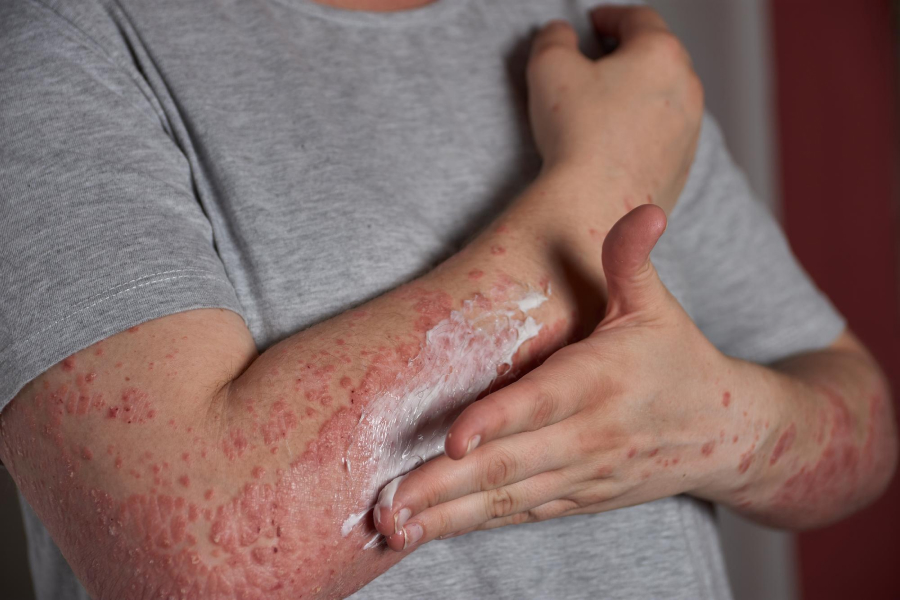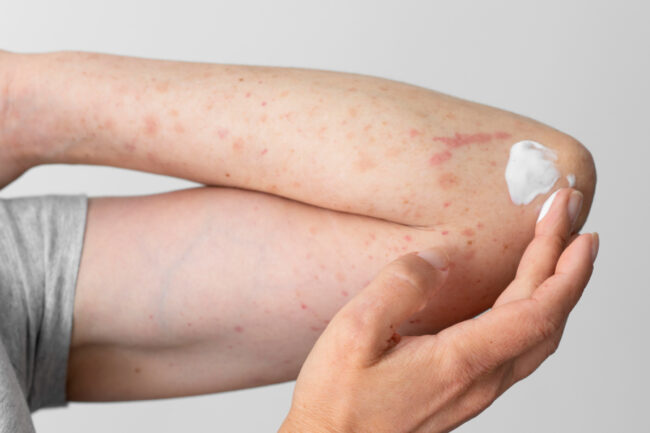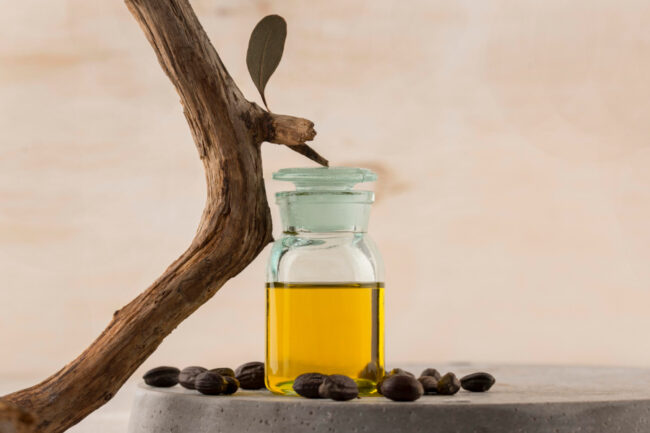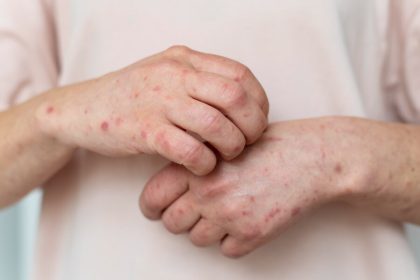While natural treatments for scabies are widely available and effective, many individuals are turning to natural remedies, intrigued by the potential of alternative options.
This article delves into the science behind these natural treatments for scabies, offering an engaging, informative, and evidence-based guide to help you navigate your options.
Common Symptoms of Scabies
The hallmark symptoms of scabies include:
- Intense Itching: This is often worse at night.
- Rash: Small, red bumps or blisters that often form a line or track.
- Sores: Caused by scratching, these can become infected with bacteria.
- Thickened Skin: In severe cases, particularly in crusted scabies, the skin may become thick and scaly.
Understanding these symptoms is crucial for early detection and treatment, which can prevent the spread of scabies to others.
Conventional Treatments for Scabies
Before diving into natural treatments for scabies, it’s essential to understand the conventional treatments often prescribed by healthcare professionals.
Ointments, Creams, and Lotions Commonly Prescribed
- Permethrin Cream: This is the most commonly prescribed scabicide. It kills the mites and their eggs.
- Benzyl Benzoate Lotion: Another effective treatment, though it may cause irritation in some people.
- Sulfur Ointment: Safe for use in pregnant women and young children.
- Crotamiton Cream: Used to relieve itching and kill mites.
Medications to Alleviate Scabies Itch
- Antihistamines: Help reduce itching.
- Steroid Creams: Reduce inflammation and itching.
While these natural treatments for scabies are effective, some individuals seek natural remedies due to concerns about side effects or personal preferences for holistic approaches.
Natural Remedies for Scabies
Tea Tree Oil for scabies: Effectiveness and Usage
Tea tree oil is renowned for its antimicrobial and anti-inflammatory properties. Scientific studies have shown that tea tree oil can effectively kill scabies mites and soothe the skin. For example, a study published in Archives of Dermatology found that tea tree oil was as effective as conventional treatments in eradicating scabies mites.
How to Use: Mix a few drops of tea tree oil with a carrier oil (like coconut oil) and apply it to the affected areas twice daily. Be cautious of potential allergic reactions by performing a patch test before full application.
Skipping Soap
While it might sound counterintuitive, reducing the use of soap can actually help manage scabies. Overuse of soap can strip the skin of its natural oils, leading to dryness and irritation, which can exacerbate itching.
Alternative: Opt for gentle, hydrating cleansers or natural remedies like colloidal oatmeal, which can soothe the skin.
Oatmeal Bath
An oatmeal bath can provide relief from itching and inflammation. Colloidal oatmeal has anti-inflammatory properties that can help soothe irritated skin.
How to Use: Add a cup of finely ground oatmeal to warm bath water and soak for 15-20 minutes. This can be done once or twice daily for relief.
Importance of Essential Oils like Clove Oil and Turmeric
Clove Oil
Clove oil has been found to have antimicrobial properties effective against scabies mites. A study published in Parasitology Research indicated that clove oil has scabicidal activity.
How to Use: Dilute clove oil with a carrier oil and apply it to the affected areas. Perform a patch test before using extensively.
Turmeric
Turmeric is known for its anti-inflammatory and antimicrobial properties. While not directly studied for scabies, its benefits for skin health are well documented.
How to Use: Make a paste using turmeric powder and water, apply it to the affected areas, and leave it on for 30 minutes before rinsing off.
Other Natural Treatments for scabies Backed by Scientific Studies
Neem Oil
Neem oil has been used traditionally to treat various skin conditions, including scabies. Studies have shown that neem oil has anti-parasitic properties effective against scabies mites.
How to Use: Apply neem oil directly to the skin or use neem-based soaps and lotions.
Aloe Vera
Aloe vera is well known for its soothing and healing properties. A study published in the Journal of Dermatological Treatment found that aloe vera was as effective as benzyl benzoate in treating scabies.
How to Use: Apply pure aloe vera gel to the affected areas and leave it on. Repeat several times daily for relief.
Other Ways to Reduce Spread
How to Prevent the Spread of Scabies
Preventing the spread of scabies is as important as treating it. Here are some strategies:
- Avoid Close Contact: Avoid direct skin-to-skin contact with infected individuals.
- Wash Clothing and Bedding: Wash all clothing, bedding, and towels in hot water and dry on high heat.
- Vacuum: Vacuum furniture and floors to remove any mites that might have fallen off the skin.
- Isolate Personal Items: Store personal items that cannot be washed in a sealed plastic bag for at least 72 hours.
Understanding Risk Factors for Scabies Infestation
Certain factors increase the risk of scabies infestation, including:
- Crowded Conditions: Living in close quarters, such as nursing homes or dormitories, can facilitate the spread.
- Weakened Immune System: Individuals with compromised immune systems are more susceptible.
- Prolonged Skin Contact: Those with frequent, prolonged physical contact with others are at higher risk.
Awareness of these risk factors can help in taking preventive measures.
Consulting a Healthcare Specialist
While natural treatments for scabies can be effective, it’s important to know when to seek professional medical advice. Seek help if:
- Symptoms Persist or Worsen: If natural remedies do not alleviate symptoms within a few days.
- Secondary Infections: Signs of bacterial infection (such as increased redness, swelling, or pus) develop.
- Crusted Scabies: If the skin becomes thick and crusted, medical treatment is essential.
Diagnosis and Treatment Options
A healthcare provider can diagnose scabies through a physical examination and skin scraping. Natural treatments for scabies options may include:
- Prescription Scabicides: Stronger medications that effectively kill mites.
- Oral Medications: In severe cases, oral ivermectin may be prescribed.
- Follow-Up Care: Ensuring complete eradication of mites and preventing reinfestation.
Conclusion
Natural treatments for scabies offer promising alternatives to conventional methods, with scientific evidence supporting the efficacy of several options such as tea tree oil, neem oil, and aloe vera.
However, it’s important to combine these with preventive measures and seek medical advice when necessary.
By understanding the causes, symptoms, and natural treatments for scabies, you can make informed decisions and find relief from this irritating condition.
FAQs
Can Scabies be Transmitted from Pets?
No, scabies is caused by a specific mite (Sarcoptes scabiei var. hominis) that only infests humans. However, animals can be infested by a different type of mite, causing mange.
How Long Does Scabies Last Without Treatment?
Without natural treatments for scabies, scabies can persist indefinitely as the mites continue to reproduce. Symptoms will worsen over time and can lead to secondary infections.
Are There Any Home Remedies to Avoid Scabies Infestation?
To prevent scabies, avoid close contact with infected individuals, wash bedding and clothing regularly, and maintain good personal hygiene. Natural treatments for scabies like tea tree oil and neem oil may help in reducing the risk of infestation when applied as preventive measures.








